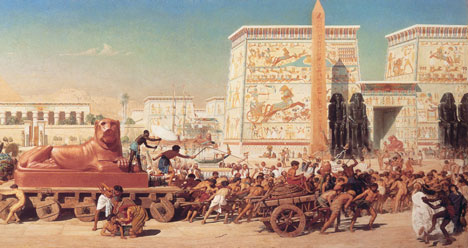Slavery: A Means To An End
 One of the reasons why moderns (including Christians) don’t really know what to do with the Mosaic Law is the failure to understand biblical history as a process of maturation. The prohibition of the second (kingly) tree in the Garden corresponds to the Food Laws, for instance. Like Israel’s temporary abstinence from meat (kingly food) in the wilderness, these laws were all for the purpose of humbling, for preparing servants to rule as God’s representatives. Once mature, they would be invited to eat with God as friends, rather than merely attending as servants.
One of the reasons why moderns (including Christians) don’t really know what to do with the Mosaic Law is the failure to understand biblical history as a process of maturation. The prohibition of the second (kingly) tree in the Garden corresponds to the Food Laws, for instance. Like Israel’s temporary abstinence from meat (kingly food) in the wilderness, these laws were all for the purpose of humbling, for preparing servants to rule as God’s representatives. Once mature, they would be invited to eat with God as friends, rather than merely attending as servants.
The Bible’s laws concerning slavery are frequently used by atheists (perhaps this is one reason why both Hitchins and Dawkins recommend that people not remain in ignorance of the Scriptures). But an unyielded heart will never understand the Bible. One can be familiar with all of the Scriptures and still remain in the dark.
Alastair Roberts has a very interesting rundown on slavery. Here is an excerpt:
The state of slavery to men is not celebrated in Scripture. It is a state of immaturity akin to that of childhood. YHWH’s intention is always that people gain maturity through obedience. The biblical expectations of the slave were similar to those upon children: to grow in responsibility through faithful obedience. Like childhood, it is very negative for people to return to the state of slavery: rather, people must grow beyond it and the strict law-bound character of slavery, like that of childhood, can provide a means of maturation. Biblically, slavery is oriented towards manumission and blessing. Slave-owning is a means by which the righteous and provident man can come to provide for and protect many dependent people, training them towards responsible independence, or fully absorbing them into the life of his family.
While we have clear continuing forms of dependency relations in society, it is very good that we have moved beyond slavery in many respects. The sort of slavery spoken of in Scripture was necessary and served good purposes in a less developed society. However, as society matures, such an institution fitted for a more childlike stage in humanity’s life should be left behind…
Peter Leithart has made a persuasive case (The Priesthood of the Plebs fills out this argument) for regarding priests as household servants. The story of the Exodus is the story of the movement from slavery to Pharaoh in the Egyptian house of bondage, building store cities, to service as royal priests in YHWH’s house and building the tabernacle.
In Exodus 21:5-6 and Deuteronomy 15:16-17, we encounter a strange ritual in which the servant who loves his master and wants to bind himself to him from that point onwards, beyond the period of his appointed service, has his ear pierced against the doorpost with an awl and is adopted into his master’s household as a homeborn slave. The bloodied doorposts of the Passover relate to this. The servants of Pharaoh are judged with all of his household. However, the Israelites, by applying the blood representing its commitment to be YHWH’s firstborn slave-son to the doorposts, comes under the refuge and protection of YHWH’s house and is not judged with the household of the dragon, Pharaoh.
In Numbers 3, as we have seen, YHWH will claim the Levites in exchange for the firstborn of Israel as his primary servants, concerned with the priestly running of YHWH’s tabernacle and the house of Israel. The establishment of the priestly ministry is one of the purposes for which YHWH released Israel. The bored ear of the adopted servant relates to part of the ordination rite (and also to circumcision), in which the ear of the priest was bloodied.
Jordan also suggests the possibility of a relationship between this rite and the incarnation:
The incarnation of the Second Person of God is spoken of in terms of this provision. Psalm 40:6 states, “Sacrifice and mea1 offering Thou hast not desired; My ears Thou has opened;” the NASV margin notes that “opened” is literally “dug, or possibly, pierced.” This verse is cited and paraphrased in Hebrews 10:5 thus, “Sacrifice and offering Thou hast not desired, but a body Thou hast prepared for Me.” The boring of the ear, making a free person into a slave, is here a figure for the incarnation. As Paul puts it, He “made Himself of no reputation, taking the form of a slave, being made in the likeness of men” (Phil.2:7).
You can read the full article here. Also, James B. Jordan’s Slavery in Biblical Perspective is a must read (available from www.biblicalhorizons.com)

























